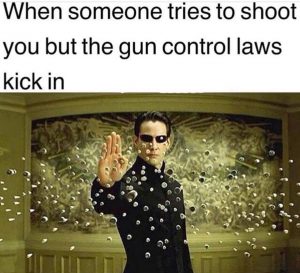This article from NPR is interesting, as it refers to a recent study from the RAND Corporation (rather than some gun-control think tank) about what gun policies actually work to reduce violent crime.
The article can be summed up by the line, “The nonprofit RAND Corporation analyzed thousands of studies and found only 63 that establish a causal relationship between specific gun policies and outcomes such as reductions in homicide and suicide.”
Let’s go through the meat of the article:
“Most of the effects that we were looking for evidence on, we didn’t find any evidence,” says Andrew Morral, a behavioral scientist at RAND and the leader of the project.
This isn’t surprising: in general, criminals don’t follow laws, so gun control means little to them.
They found, for example, no clear evidence regarding the effects of any gun policies on hunting and recreational gun use, or on officer-involved shootings, or on mass shootings or on the defensive use of guns by civilians.
Again, not particularly surprising: most gun laws don’t seek to restrict hunting (other than basic things like hunting season times, restrictions on certain prey, etc.) or recreational gun use.
Officer-involved shootings and defensive gun uses by civilians (note: police officers are also civilians) are usually explicitly permitted by law in life-threatening situations, so I don’t really see the relevance.
The point about mass shootings isn’t unexpected: mass shooters tend to plan their attacks meticulously for a long period of time and are very detail-focused. All the “common sense gun laws” like waiting periods, background checks, etc. wouldn’t have any effect on someone willing to plan and wait as needed.
There were some categories with better data, however, Morral says. There is relatively strong evidence, for example, that policies meant to prevent children from getting access to firearms — such as laws that require guns to be stored unloaded, or in locked containers — reduce both suicide and unintentional injury and death.
Makes sense. Leaving loaded guns lying openly around the house when there’s kids or irresponsible adults around is an invitation to disaster. Fortunately, this is quite rare.
Guns should be secured when not under the immediate control of the owner.
Previous work has also found that places that require a permit (issued by law enforcement) for the purchase a firearm do reduce violent crime.
This surprised me a bit, but I’m curious how that works out: I suspect that criminals of any sort don’t end up getting permits, and that permit holders don’t commit much crime.
[a few minutes elapse as I read the linked study, available as a PDF]
Ok, the study basically says that if a state requires permits to purchase a gun, guns are less likely to end up being diverted to criminals. I wonder how much of this is psychological, in that the would-be straw purchaser is a bit more concerned that their name and fingerprints are “in the system” once they get a permit, even though their information is kept on the Form 4473 during a retail purchase anyway. Either way, permits should never be required for a constitutionally-protected right.
There is also some evidence that prohibitions against purchase by people who have been diagnosed with mental illness reduce violent crime, and that “stand your ground” laws, which allow citizens who feel threatened in public to use lethal force without retreating first, lead to an increase in violent crime.
As for mental health, that’s expected. As for stand your ground laws, the issue is not so much an increase in violent crime, as reported by NPR in this article, but an increase in homicides. How a homicide is classified — as a justifiable homicide, for example, or an unlawful homicide — is dependent on how police classify shootings. From an earlier NPR article on the topic, “Police guidelines likely vary from state to state, and police in different places may be interpreting shootings differently in light of stand your ground laws.”
Also interesting is the results of a survey of 95 gun policy experts “from across the political spectrum”, who they asked for their thoughts on effects of various policies including “universal background checks, bans on the sale of assault weapons and high-capacity magazines, expanded mental illness prohibitions, minimum age requirements and required reporting of lost or stolen weapons”.
The vast majority of the specialists RAND surveyed agreed that the primary objectives of gun policies should be reducing suicides and homicides, and that protecting privacy, enabling hunting and sport shooting and preventing mass shootings were secondary priorities.
“That was a surprise, actually,” says Morral. “I think people on either side of gun policy debates think that the other side has misplaced values — or that it’s a values problem, in any case. But that’s not what we find. We find people prioritize the same things in the same order.”
However, those surveyed varied widely in their predictions about how different policies would affect each outcome.
“Where they disagree is on which laws will achieve those those objectives. So this is a disagreement about facts,” says Morral. “And the facts are sparse.”
So, no surprises there. Still, it’s an interesting study and I recommend you read it.
